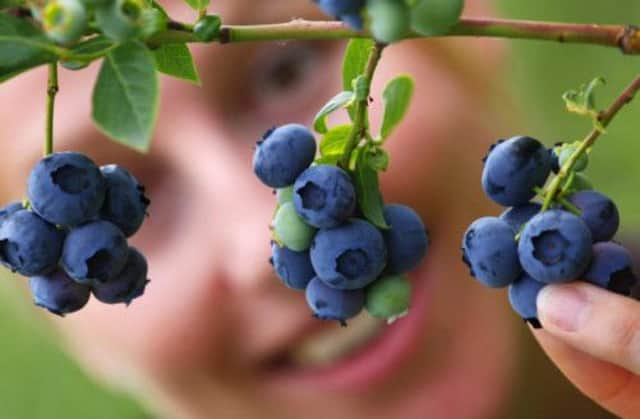Raspberries in decline as blueberry demand soars


Raspberry farmers across Scotland are diversifying into blueberries and even cherries as the returns for raspberries diminish amid falling prices, lower demand and disease-ridden crops.
Nikki Jennings, a raspberry breeder for the James Hutton Institute in Dundee, said an increasing number of growers were finding it difficult to make a living purely from growing raspberries.
Advertisement
Hide AdAdvertisement
Hide Ad“It seems to be the case that blueberries have taken over from raspberries,” she said. “There is an increased demand from consumers for blueberries because of perceived health benefits and their reputation as a superfood.
“From the growers’ side, raspberries are costly to produce and price has been so low of late they are not making much money, so they haven’t replanted their raspberries and have gone instead with blueberries and cherries.”
Blueberries are now the second most popular berry on the market behind strawberries, having overtaken raspberries in popularity in 2010. There are now in excess of 15,000 tonnes a year sold in the UK, up from 1,000 a decade ago, according to the trade body British Summer Fruits.
Peter Thomson, of Thomas Thomson, one of Perthshire’s biggest raspberry growers, said he does not plan to replant raspberries in the future.
“We will be stopping raspberry production in the next couple of years,” he said. “In the future we will be growing blueberries and cherries. One of the problems is that the variety that produces the most raspberries at the lowest cost doesn’t grow well in Scotland. They are also prone to disease, which can be devastating.”
Some raspberry crops in recent years have been ravaged by raspberry root rot, a disease that can infect whole rows of plants, causing them to wilt and die. Research is under way at the James Hutton Institute to breed new disease-resistant varieties.
Two projects, supported by the UK Raspberry Breeding Consortium and the Scottish Government, have enabled researchers to identify genetic markers linked to resistance to Phytophthora root rot, and these markers are now being used in a breeding programme to identify resistant varieties.
Jennings, who has been working on the project, said: “The hope is that we can breed raspberries that are less susceptible to disease and attractive to supermarkets. We are using molecular technology to speed up the breeding process. It takes a minimum of 15 years to produce a new variety, and for a grower, that is a frustrating time scale.”
Advertisement
Hide AdAdvertisement
Hide AdRowan Marshall, of Peter Marshall Farms near Blairgowrie, said the farm had chosen to diversify into blueberries because of the dangers of focusing too much on one crop.
“There is a good gap in the market that Scotland fits into quite well between the Polish blueberry crops and the English crops finishing. Sales of blueberries are jumping every year and we don’t want to keep all our eggs in one basket by just growing raspberries.”
He said their planting of raspberries had “slowed down” in recent years. “If markets are squeezed you’ve got to look at something else. The root rot doesn’t help either.”
Blueberries have been credited with myriad health benefits due to having one of the highest antioxidant capacities among all fruits and vegetables. Antioxidants help combat free radicals that can damage cellular structures as well as DNA. Just last week, a study published in the British Medical Journal said that eating more blueberries was shown to lower the risk of developing Type 2 diabetes.
Ross Mitchell, a strawberry and raspberry farmer in Laurencekirk, started growing blueberries in 2006 and cherries in 2010.
“The sales growth of blueberries has been phenomenal,” he said. “It’s partly because of the health benefits – because it’s known as a superfood – it’s a fantastic fruit that people want to eat and it’s also great to grow.”
Where raspberries used to account for 20 per cent of his berry crop, the other 80 per cent being strawberries, he has now dropped down to only 5 per cent, with 15 per cent being blueberries.
“There have been a number of issues putting people off the market,” he said. “Prices have been depressed the last couple of years in particular. It’s an issue we’re battling.”
Twitter: @emmacowing